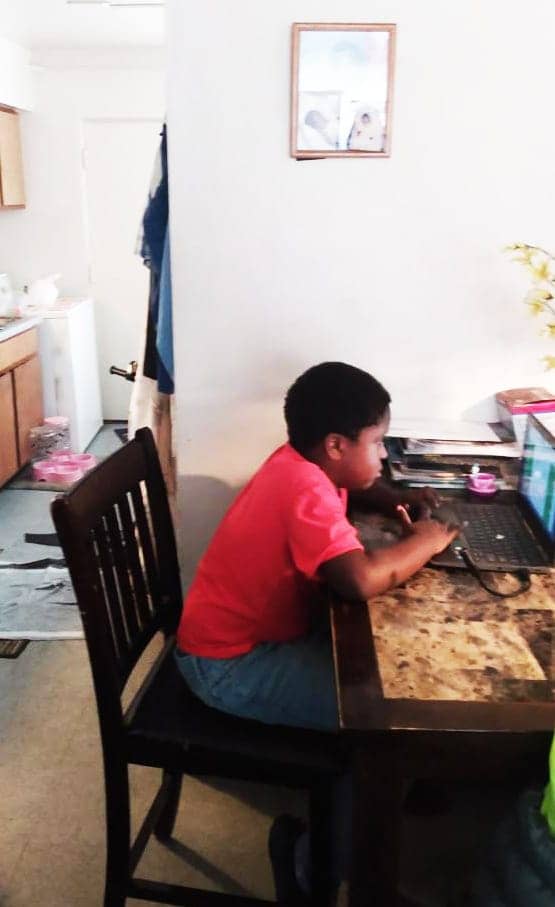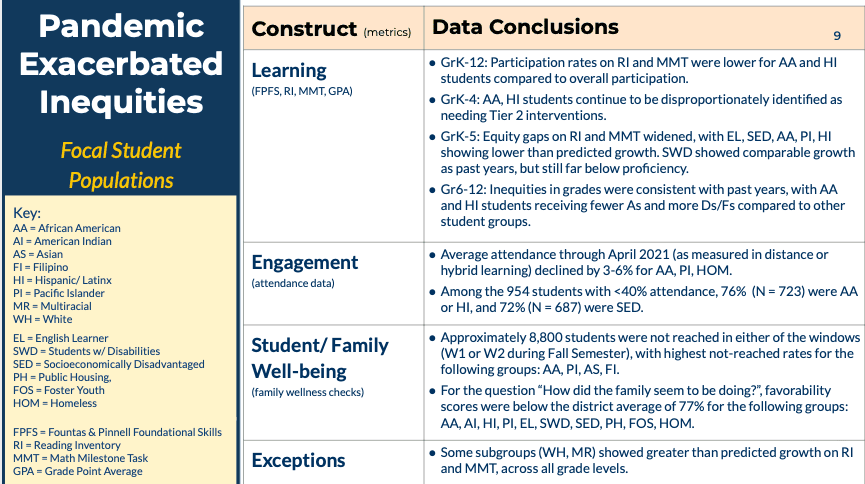
by Daphne Young
When the San Francisco Unified School District (SFUSD) started rolling out its staggered return to school plan for in-person learning in April, nearly half of the families surveyed with students in sixth through 12 grades opted to stay home.
According to Deputy Superintendent Enikia Ford Morthel, only a third of secondary students and their families responded to the school district’s survey. Morthel said SFUSD received responses from 79 percent of third through fifth grade families and at least 90 percent response from families with students in grades pre-kindergarten to second grade. But less than 53 percent of the families with students in middle and high school responded to this survey.
“We recognize that students and families will experience this last part of the school year in different ways and we want to be sensitive to that and meet students where they are,” SF Board of Education President Gabriela López said.
But if it’s really about meeting students where they are, then SFUSD failed a large number of students of color.
SFUSD Deputy Superintendent Enikia Ford Morthel also told SFUSD board members at the May 4 meeting that the district has lost touch with approximately 8,800 students during the 2020-21 school year. According to Morthel, the hardest-hit groups of students were African American, Asian, Pacific Islander and Filipino.
Morthel presented a slide presentation report titled “Pandemic Inequities for At-Risk Students” during the Zoom special committee meeting. During that same meeting, Morthel also discussed SFUSD’s failure to reach students who are socioeconomically disadvantaged, disabled, homeless and foster youth.
This means that, for those 8,800 at-risk students in the state’s seventh-largest school district, they didn’t get the distance learning, educational and supportive services they were entitled to for a whole year. These students of color didn’t attend distance learning classes, meetings or even special events during an entire 2020-21 school year. If a parent failed to do this, they’d be arrested.

So, does SFUSD get to keep the money they were paid for these students? Or should that check go to the individual families – i.e., parents – who became their virtual instructors?
Single mom Elyse Stewart is one of those parents. Stewart’s third grader, Marquese, is on the roster at Hillcrest Elementary School, but he hasn’t taken part in distance learning all year long. Elyse tells the SF Bay View she feels SFUSD failed her third grader.
“I had the worst experience in my life,” Stewart said. “I’ve done everything that I could. They sent me a tablet and wifi … and neither worked. They were supposed to be replaced and it never happened. I got tired and frustrated. It’s not worth it.”
She says that school officials at Hillcrest Elementary kept calling because her son wasn’t showing up for his classes on Zoom. But, Stewart said, she’s done everything she could to get him online and even tried getting him connected by phone. Nothing worked.
So, the Bayview native took her son’s education into her own hands and began homeschooling him.
“I talked to his teacher, the social worker and spent hours on the phone with the IT department, but nothing worked. We never got a good connection and the Chromebook they sent us, and replaced, still didn’t work,” Stewart said. She added: “We could never get to my son’s online assignments with the Chromebook they issued him.”
Stewart said she was the one putting in all the effort and that no one came out to help set up the wifi system her son needed to get online. In fact, according to Stewart, she and her son had no idea how to set it up.
So, the Bayview native took her son’s education into her own hands and began homeschooling him last fall. In November someone from SFUSD did finally bring books for reading and math and supplies to her home, said Stewart. But it wasn’t enough. So, when the school district at the end of the year finally decided to reopen for a few weeks, she said, “no thanks.”
Stewart added: “Everybody has different emotions … living situations, have changed jobs … or no job.” At the beginning of the pandemic, Stewart worked a graveyard shift but had to quit that job in order to be home with her son during the day. She said her new schedule allowed her to work with her son two hours each day doing math and reading. But, she said, it was stressful.
“How many children have fallen through the cracks? They’re not looking at our children. No devices … no wifi … no technology. Some can’t just sit down in front of a camera and learn.”
“He couldn’t read before, but now he can read fluently,” Stewart said. “So I know he’s improving and learning.” Stewart said SFUSD failed to support her child’s academic needs and that’s why he’s been absent.
For many kids in the Bayview Hunters Point area, it’s the same story – technology issues. Carolyn Gage, a grandmother of seven students who attend SFUSD schools in Bayview, is also concerned.
“How many children have fallen through the cracks? They’re not looking at our children. No devices … no wifi … no technology. Some can’t just sit down in front of a camera and learn,” Gage said. The Bayview grandmother said she’s in disbelief that SFUSD lost contact with so many students this past year.
“How can a child just be lost through the school system for a whole year? That’s totally unacceptable,” said Gage. All of Gage’s grandchildren attended Malcolm X Academy. She says she loves the teachers there. “They’re hardworking and very attentive. Thanks for the teachers,” said Gage.
“There are so many mixed messages. Just don’t know what’s going on … and vaccinations aren’t complete.”
Her family also opted not to return to in-person school because it didn’t feel safe. “With all the stories that we hear about the Coronavirus variant, plus, you hear about children giving it to teachers and taking it back home, it raises a lot of concerns,” said Gage.
“There are so many mixed messages. Just don’t know what’s going on … and vaccinations aren’t complete. If adults are confused, you know the children are confused.” She added, “I believe a lot of the high school students are as scared as the little ones. We just have to do what’s best for your family.”
Meanwhile, Elyse Stewart plans to continue to keep her son Marquese home, at least until kids get vaccinated. “Bad as I want him to go back, this [COVID-19] is not something to play with. It’s not a common cold,” Stewart said.
The Bayview mom is not only frustrated with her son’s school, but also with leaders at SFUSD. “We’re really not getting any solid answers. Nothing’s adding up. [We] can’t get a straight answer. So, I’d rather sit back and let him go back in the summer or fall. That’s what they should have done,” said Stewart.
Many parents in the Bayview Hunters Point community feel that SFUSD has failed students of color, especially during this pandemic. Tell us what you think about the estimated 8,800 students that SFUSD failed to reach and teach through distance learning this past school year? Email us: education@sfbayview.com.
Daphne Young is the new Education Reporter at the San Francisco Bay View National Black Newspaper. The Chicago native began her journalism career as an intern at the Chicago Daily Defender, once the largest Black newspaper in the country. Since then, she’s covered breaking news, crime, politics, education, entertainment and sports at several radio and TV stations around the country: WBBM-AM, WSB-AM, WBGO, WIOD, WSFA-TV, KERO-TV3, KESQ-TV3, KDWN and iHeart Radio SF. Daphne is also a contributing producer for the environmental podcast Climate One. Daphne and her family live in the Bay Area. Contact her at education@sfbayview.com.





